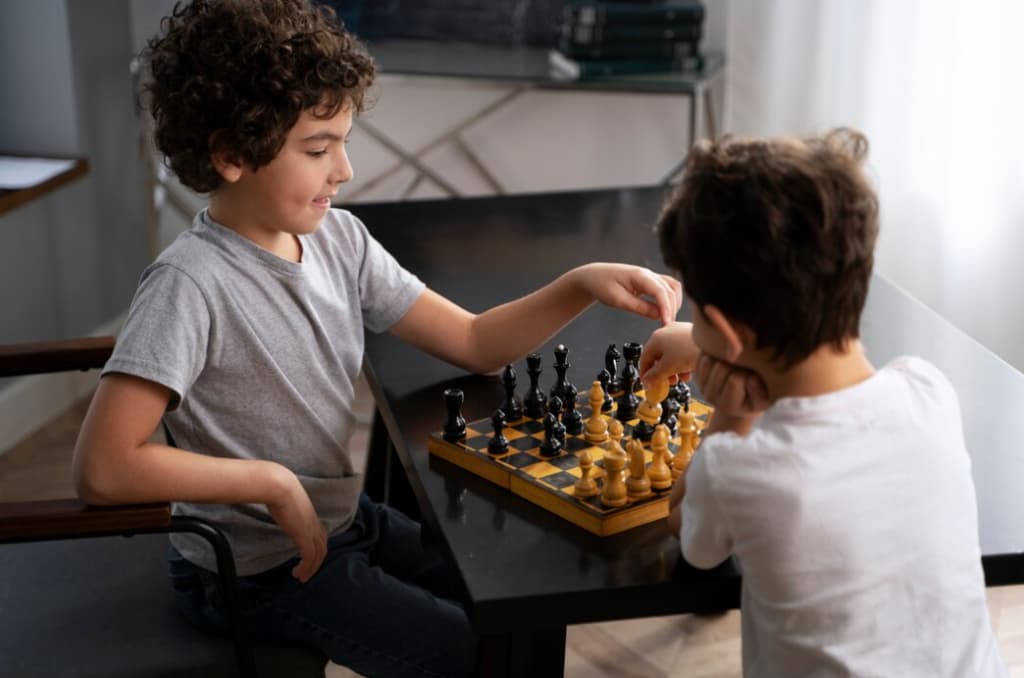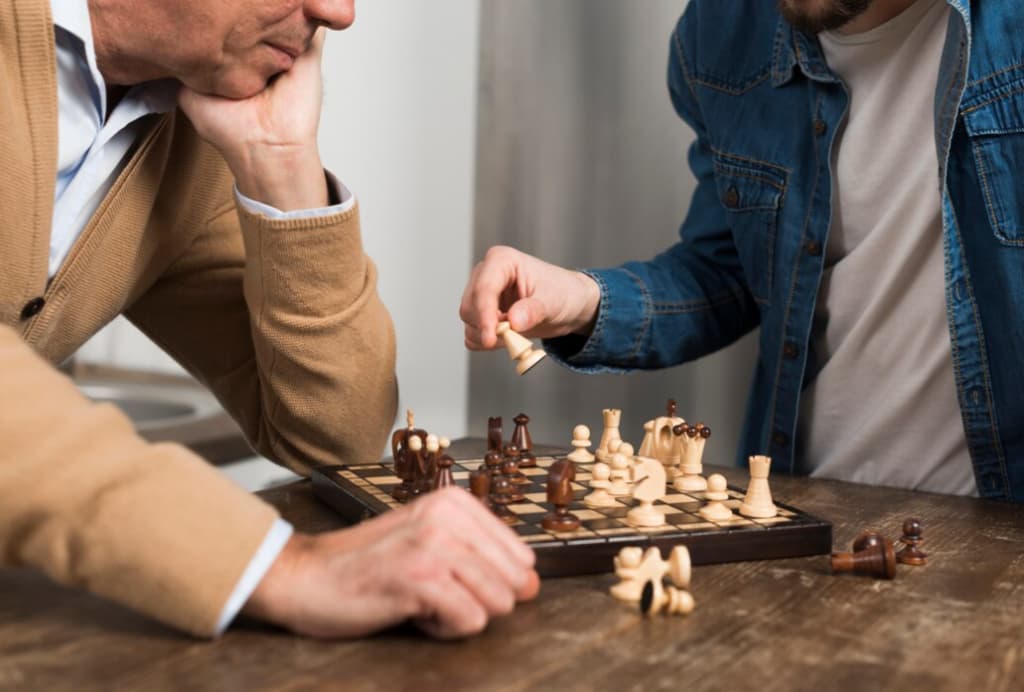Chess is not merely about making moves on a board; it’s an intricate dance of strategic thinking and pattern recognition. You might be contemplating the time investment required to delve into this cerebral game. Let’s delve deeper into that.
On average, committing to 1-2 years of consistent daily practice will establish a solid chess foundation. The progression, of course, is influenced by the dedication and time one allocates to honing their tactics daily.
True chess mastery goes beyond mere move selection; it’s about anticipating your opponent’s strategies and countermoves. This requires sharpening both cognitive and intuitive faculties through continuous practice and focus. The duration to attain mastery can vary significantly, hinging largely on one’s passion for the game and the regularity of engaged training sessions.
This piece aims to clarify your questions and offer strategies to enhance your prowess in chess. Continue on to uncover more!
Balancing Technical Mastery with Practical Training in Chess
To truly excel in chess, one must strike a harmonious balance between acquiring technical knowledge and practicing actual gameplay. While understanding chess theory and its nuances is essential, solely immersing oneself in it can lead to a lopsided growth. If you pour years into gameplay without integrating learned techniques, you might become proficient in sustaining longer games, but not necessarily in playing them well.
On the other hand, over-relying on theoretical knowledge without hands-on practice can leave you ill-equipped for real-time decision-making on the board. Thus, to optimize your chess prowess, it’s imperative to intertwine the study of technical aspects like openings, endgames, strategies, and maneuvers with consistent practice. This combined approach ensures not just knowledge, but the adeptness to apply it effectively in games.
Charting Your Path: From Chess Novice to Expert
Embarking on the journey to become a proficient chess player requires both passion and a clear vision. Establishing a definitive goal is paramount, as it guides your progression from novice to expert. Many falter in their chess journey simply due to the absence of a clear objective.
Begin by crystallizing your ambition. Much like any voyage, without a set destination, you might wander aimlessly. In the realm of chess, this means starting with the basics, like understanding each chess piece, and then advancing to the complexities of strategy, tactics, and intricate positions. By setting and pursuing your goal steadfastly, you’ll navigate the path to advanced chess expertise with purpose and clarity.
Starting as a novice? Aim first for intermediate prowess before setting your sights on achieving an advanced chess rating of 2100 or higher.
- Establish concrete, achievable benchmarks. As a newcomer to the game, envision yourself at that advanced level and chart a clear path to get there. Setting specific milestones will keep you anchored and motivated;
- Pay attention to your endgame techniques; ensuring a strong finish is crucial. Commit to daily practice, delving into new tactics and strategies. Online chess puzzles are an excellent resource to sharpen your skills, enabling you to discern patterns, strategize board positions, and execute decisive moves;
- Consistently allocate 1-2 hours each day for practice. Over the span of a year or two, this commitment will significantly bolster your strategic thinking and overall confidence. Remember, your journey to chess expertise hinges on unwavering focus and perseverance. Your level of dedication will be the ultimate determinant of your chess acumen.
A Structured Approach to Mastering Chess
Embarking on the path to becoming a proficient chess player demands clear objectives. Without well-defined goals, many players find themselves lost and unable to progress. Establishing these goals is paramount to transitioning from a novice to a master.
- Begin by laying down your aspirations. Without a clear vision, you might wander aimlessly in the vast landscape of chess. The journey starts with understanding the basic elements, like the distinct roles of each chess piece, and then advancing to intricate strategies and tactics;
- For novices, aim to progress to the intermediate tier before setting sights on achieving a rating of 2100 or higher.
- Ensure that your objectives are both tangible and achievable. Starting out, it’s entirely feasible for a beginner to aim for advanced milestones. Define these targets and relentlessly pursue them;
- Pay close attention to your endgame; perfecting it is crucial. It’s essential to remain persistent, refining your strategy and tactics daily. Engaging with online chess puzzles can immensely bolster your skill set, enabling you to discern patterns, establish board positions, and determine optimal moves;
- Committing to a regimen of 1-2 hours of practice daily for a span of 1-2 years will solidify your strategic foundation and hone your cognitive acumen. Your unwavering focus and relentless dedication will ultimately dictate the caliber of chess player you evolve into.
Chess Learning Across Different Age Groups

The chess learning analysis is segmented into three age brackets: under 10, 11-12 years, and 18 years and older. This division delves into the unique learning capabilities and advantages of chess for each group. Additionally, potential challenges or drawbacks of engaging in chess across these age ranges are explored.
Chess Learning for Kids (Under 10)
Children below 10 years typically experience fewer academic pressures, allowing them more free time for recreational activities with friends, family, and even online gaming. This leisurely pace offers an excellent window for them to explore and nurture an interest in chess. With dedication, they can grasp the fundamentals—like piece movements, castling, and pawn promotions—and potentially achieve a proficient level within 1.5 to 2.5 years.
Starting chess at this tender age not only sharpens their cognitive abilities but also enhances alertness and strategic thinking, which can indirectly benefit their academic performance. Encouraging chess during their downtime can be a valuable exercise in stimulating young minds.
However, it’s worth noting that children in this age bracket might not exhibit deep analytical thinking or devise intricate strategies as effectively as older players. While they can play the game competently, their decision-making might occasionally lack the depth and reasoning expected from more mature minds.
Chess Learning for Adolescents (Ages 11-15)
Adolescents aged 11 to 15 are at a developmental stage where they can grasp abstract ideas, exhibit scientific and logical reasoning, and showcase an enhanced ability to calculate. Engaging with chess during these formative years can be particularly rewarding. On average, with consistent practice, they can attain a professional competency in chess within 2 to 3 years.
Regular chess play at this age can significantly bolster cognitive and reasoning abilities, ensuring that their minds remain agile and astute.
However, consistency is key. Taking extended breaks from chess, especially during periods of academic intensity, can lead to feelings of stagnation or idleness. This can be particularly evident when they return to solve chess-related problems or puzzles. Hence, balancing chess with other commitments is crucial to maintain momentum and avoid potential pitfalls.
Chess Learning for Adults (18+)
For those diving into the world of chess at 18 years or older, the path to becoming a formidable player typically spans 3-4 years. This extended timeline often stems from the myriad responsibilities and commitments that adults juggle, which can limit dedicated chess practice.
However, with unwavering commitment and immersion in the game, one can make significant strides in just a couple of years.
Adult players should focus on honing their chess strategies, perfecting tactics, and cultivating a deep understanding of game concepts and logical reasoning. This foundation will equip them to navigate complex, high-level matches with confidence.
To truly excel, adults must maintain a consistent practice regimen. A sporadic or casual approach might lead to gaps in skills and hinder the development of the analytical prowess that chess demands.
Quick Steps to Elevate Your Chess Performance

To ascend the ladder of chess mastery swiftly, it’s essential to immerse yourself in dedicated and dynamic training sessions daily. Ever wondered what stands behind the impeccable moves of grandmasters? It’s their unwavering commitment to daily rigorous training that keeps them on their toes and their minds razor-sharp. This consistent engagement not only equips them with innovative strategies but also inculcates a robust tactical vision.
- The onus is on you to proactively develop your skills. This entails sharpening your ability to calculate moves ahead, enhancing your spatial understanding of the chessboard, and constantly challenging your cognitive capabilities;
- Consistency is key in your practice regimen. By allocating a specific block of time each day or week to your chess pursuits, you’ll cultivate discipline, making your training sessions more fruitful. This consistent dedication not only refines your understanding of the game but also amplifies your confidence in your strategies and moves;
- However, it’s not just about the quantity but the quality of your practice. An effective training session should encompass a plethora of activities, including but not limited to calculating various move sequences, dissecting tactical scenarios, and engaging in strategic exercises. By incorporating these elements, you’re setting the stage for holistic growth in the game, ensuring you evolve into a well-rounded and formidable chess player.
Conclusion
To quickly ascend in the world of chess and establish yourself as a proficient player, you must immerse yourself in mastering diverse skills and exploring advanced tactics. With unwavering dedication and effort, your strategic prowess will naturally evolve. Commit to consistent training sessions and regularly challenge yourself with chess puzzles to maintain momentum and stave off any potential waning of interest in the game. You might be interested in Viswanathan Anand IQ.